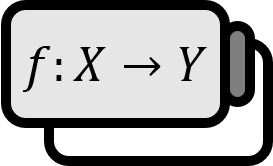Euler's Proof: Finding the Sum of Reciprocals of Squares Using the Sinc Function
Theorem
$$ \sum_{n =1 }^{\infty} {{1} \over {n^2}} = {{ \pi ^2 } \over { 6 }} $$
Proof
Strategy: This proof, left by Euler, uses the Euler representation of the sinc function to provide a solution. The idea is quite fresh and interesting, making it harder to forget once you’ve seen it.
Euler representation of the sinc function: $$ {{\sin x} \over {x}} = \prod_{n=1}^{\infty} \left( 1 - {{x^2} \over { \pi^2 n^2}} \right) $$
Expanding the right-hand side of the Euler representation gives the following. $$ \prod_{n=1}^{\infty} \left( 1 - {{x^2} \over { \pi^2 n^2}} \right) = \left( 1 - {{x^2} \over { \pi^2 }} \right) \left( 1 - {{x^2} \over { 4 \pi^2 }} \right) \left( 1 - {{x^2} \over { 9 \pi^2 }} \right) \cdots $$ Meanwhile, considering the Maclaurin expansion of the sine function, the sinc function can be represented as follows. $$ {{\sin x} \over {x}} = {{1} \over {x}} \left( x - {{x^{3}} \over {3!}} + {{x^{5}} \over {5!}} - {{x^{7}} \over {7!}} + \cdots \right) $$ Both sides being equal means that the coefficients of each term are the same, and comparing the coefficients of $x^{2}$ gives us the following. $$ - {{1} \over {3!}} = - {{1} \over {\pi^2 }} - {{1} \over { 4 \pi^2 }} - {{1} \over { 9 \pi^2 }} - \cdots $$ Multiplying both sides by $- \pi^2$ results in $$ {{\pi^2} \over {6}} = {{1} \over { 1 }} + {{1} \over { 4 }} + {{1} \over { 9 }} + \cdots $$ Which simplifies to $$ \sum_{n =1 }^{\infty} {{1} \over {n^2}} = {{ \pi ^2 } \over { 6 }} $$
■
